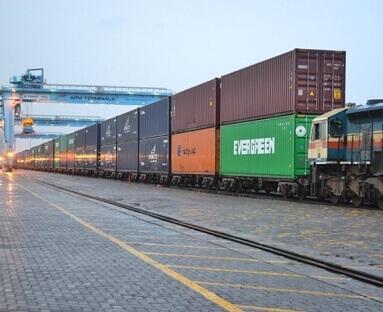As trade between China and Pakistan continues to expand under the China–Pakistan Economic Corridor (CPEC), businesses are increasingly evaluating the most efficient modes of transport for cargo. While road freight has traditionally been a go-to solution, Rail Freight China to Pakistan is emerging as the smarter, more strategic choice. Combining speed, reliability, cost-efficiency, and sustainability, rail transport is revolutionizing cross-border trade and reshaping supply chains across the region.
Here’s why rail freight is outpacing road transport as the preferred solution for China–Pakistan cargo.
1. Speed: Faster Transit Across Borders
One of the most significant advantages of rail freight is its consistent and predictable speed.
-
Rail: Goods transported from Kashgar in China’s Xinjiang province to major Pakistani cities like Islamabad, Lahore, and Karachi take roughly 10–12 days.
-
Road: Cargo transported by trucks along the same route faces variable delays due to traffic congestion, road conditions, and border checks, often extending delivery times significantly.
For businesses, rail freight’s faster transit translates into shorter lead times, better inventory management, and quicker responses to market demands, giving companies a competitive edge
2. Cost-Efficiency: Lower Transportation Costs
Cost is a major factor when choosing a freight mode. Rail freight offers a more economical solution compared to road transport, especially for bulk cargo.
-
High Load Capacity: A single freight train can carry the equivalent of dozens of trucks, reducing per-unit shipping costs.
-
Lower Operational Costs: Rail reduces fuel consumption and labor costs compared to fleets of trucks.
-
Bulk Shipments: Industries like textiles, machinery, construction materials, and electronics benefit from rail’s ability to move large volumes efficiently.
While road transport can be more flexible for smaller or urgent shipments, for businesses moving high-volume cargo regularly, rail provides better cost predictability and scalability.
3. Reliability: Consistency You Can Count On
Rail freight operates on fixed schedules, minimizing uncertainties caused by road accidents, weather, or traffic congestion.
-
Road transport can face disruptions due to landslides, heavy snow, or maintenance issues, particularly in northern Pakistan’s mountainous regions.
-
Rail corridors like CPEC’s Kashgar–Islamabad–Karachi route ensure consistent and reliable cargo delivery, allowing businesses to plan supply chains without worrying about delays.
Reliability is critical for companies dealing with time-sensitive cargo, including electronics, machinery, and consumer goods, where delays can have a direct impact on revenue.
4. Sustainability: The Greener Freight Option
Environmental concerns are increasingly influencing logistics decisions. Rail freight is significantly more eco-friendly than road transport, emitting far less carbon dioxide per ton-kilometer.
-
Trains are energy-efficient, reducing the environmental footprint of cargo movement.
-
With plans to introduce electrified locomotives and smart cargo management systems, rail freight is set to become even greener, aligning with global sustainability goals.
For businesses focused on corporate social responsibility (CSR) and eco-conscious operations, rail is the preferred choice over the carbon-intensive road transport.
5. Infrastructure and CPEC Rail Advantages
The CPEC rail corridor enhances rail freight efficiency by connecting China’s inland regions directly with Pakistan’s industrial hubs and ports. Key infrastructure benefits include:
-
Integration with Main Line-1 (ML-1): Modernized tracks from Karachi to Peshawar improve speed and cargo handling.
-
Dry Ports and Logistics Hubs: Streamlined customs clearance and cargo handling reduce transit delays.
-
Seamless Cross-Border Operations: Harmonized border procedures between China and Pakistan simplify freight movement.
This level of infrastructure sophistication is difficult to achieve with road freight, which remains dependent on mountainous highways and border checkpoints.
6. Safety and Reduced Risk
Rail freight offers enhanced safety for cargo compared to road transport.
-
Less exposure to accidents, theft, or damage due to controlled train environments.
-
Reduced wear and tear on cargo, particularly for fragile or high-value goods.
For businesses shipping expensive machinery, electronics, or perishable items, rail freight provides peace of mind and risk reduction that road transport often cannot guarantee.
7. Strategic Business Advantages
Choosing rail freight allows businesses to optimize their supply chains in multiple ways:
-
Predictable delivery schedules improve planning and reduce storage costs.
-
Scalable operations allow bulk shipments without proportional increases in cost.
-
Integration with multimodal logistics ensures seamless movement from rail to oad or sea for last-mile delivery.
These advantages make rail freight the smarter, more strategic choice for companies engaged in frequent, high-volume China–Pakistan trade.
Conclusion
While road transport may offer flexibility for small shipments or last-mile delivery, rail freight outperforms in nearly every critical metric: speed, reliability, cost-efficiency, sustainability, and safety.
Under the CPEC initiative, rail freight is simplifying cross-border trade, reducing logistics challenges, and positioning Pakistan as a key regional trade hub. For businesses looking to maximize efficiency and minimize costs, rail is clearly the smarter choice for cargo between China and Pakistan.



